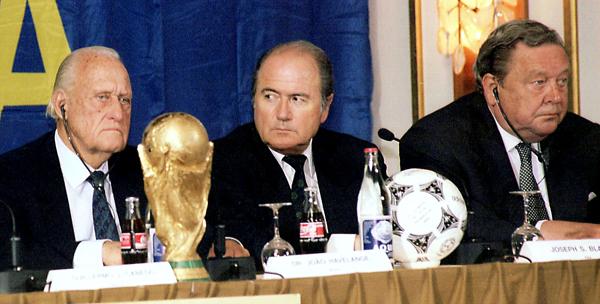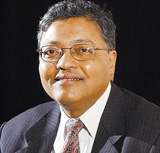Reform is the cry of the hour for FIFA. But, the question is: where does the reform start? It is not enough to open up FIFA in Zurich.
For real reform, we need to go to the heart of the organisation which extends beyond Zurich around the world. Without a worldwide fundamental structural reform, no amount of changes in Zurich will enable FIFA to come out of the crisis that has engulfed it.
People who run FIFA in Zurich may make all the right noises and promise to drive the devils and the money changers from the temple. But, even if they are truly determined to clean up FIFA and impose ironclad laws, the problem is that they are not in total control of world football.
The problem is that the central organisation in Zurich obscures the fact that FIFA is a series of Confederations. Some, like UEFA, are far richer and more powerful than others but each of the confederations has its own way of working. In that sense, FIFA House, for all its shiny, swanky offices in Zurich, is more like the Mughal Empire of India in the 18th century or China under the warlords in the 19th century.
The empires of these ancient lands had one thing in common. While the emperor in Delhi or Beijing was meant to be the supreme ruler, and treated with much visible display of his power suggesting he could get many things done, the reality was that he could only do as much as his regional barons allowed. So, for all the glory of the central ruler, his power to influence events in the far flung corners of his empire was often extremely limited, particularly if regional war lords were themselves powerful. The decay of both empires began with revolts from regional barons until such time that the central authority was proved to be as powerless as many had long suspected.
FIFA is the modern day equivalent. To add to FIFA’s problems, compared to most other sports bodies, FIFA is democrat with one member, one vote. And this means that anyone seeking election to the FIFA Presidency has to court all the voters. This is hardly the case in most other sports organisations or even some much celebrated political systems. It provides a wonderful opportunity to those who can play the football political game.
But this is not the only layer of politics. The other equally important layer is that of the confederations from different continents of which FIFA is made up. Because of the existence of these Confederations, this layer of politics comes into play at elections for FIFA’s Executive Committee. So you have a President elected by the entire FIFA Congress with Executive Committee members elected by their Confederations. So FIFA’s Executive has in-built power blocks who owe their allegiance, not to the President or the Congress but to their own Confederation. It is this that has made FIFA the most curious of organisation with two concentric circles of sports politicians constantly trying to please their constituents.

Joao Havelange (pictured above left with Blatter in centre) was the first to exploit this unique sports political system. He became President back in 1974, beating England’s Sir Stanley Rous by courting votes from non-Europeans. In the process, like any politician, he made pledges to his supporters. He could see that football was dominated by Europe and his answer was a relentless expansion of world football, providing an exponential growth in FIFA competitions. This has meant that, under Havelange and Sepp Blatter, his anointed successor, the two FIFA tournaments of 1974 – the World Cup and the Olympic football tournament – have now grown to 11. These include beach football and all sorts of tournaments for women. This is the sort of exercise in power politicians or, for that matter, emperors could only have dreamt of.
As he went round the world inaugurating new tournaments, Havelange knew that the World Cup he had inherited was the only product that would make money for FIFA. The other tournaments would never wash their face. They still do not.
Indeed, FIFA makes so little money from these competitions that it does not even give detailed breakdowns of the figures, while emphasising the money it makes from the World Cup. The figures for the last three years explain FIFA’s reluctance.
In 2008, the FIFA World Cup made $550 million (£333 million) from broadcasting rights, other FIFA events a mere $6 million (£3.6 million). In 2009 the FIFA World Cup’s broadcast revenue was $623 million (£378 million), while only $27 million (£16 million)came from other events. And, in 2010, the year of the World Cup in South Africa, FIFA made $2.408 million (£1.459 million) from broadcasters while other events contributed $40 million (£24 million). In 2010 FIFA did give a breakdown of what it made from marketing rights from other events and the picture was even more revealing. The South African World Cup generated $1.072 billion (£649 million), the marketing income from the other 10 events was just $25 million (£15 million).
FIFA Presidents have always dressed this up in high moral tones – taking the game to the neglected parts of the world and reaching places nobody, not even politicians, can. The real purpose of these other events is to take global competitions to the various Confederations, all of whom have many members, each with a vote. As an exercise in pork barrel politics, this is something even the most seasoned American politicians could not better.
The problem for Blatter, or anybody who takes charge of FIFA, is that the corruption crisis means that they can no longer carry on as if nothing has happened. However, if they are determined to clean up the organisation, there is much that could be done. For a start, FIFA’s accounts could be more transparent and fully disclose the dreadful losses all the tournaments, apart from the World Cup, make and how they are subsidised by FIFA’s only saleable commodity.
FIFA also needs to be more transparent about the money distributed through Goal Project, meant to fund facilities round the world, and how it is accounted for in the country that receives it.
But, more than that, FIFA needs to make the Confederations more transparent and accountable. Some, like UEFA already, are. Others would need to be taught what the word accountable means. And this is where the FIFA bosses in Zurich will face their greatest problem. World pressure may force them to open FIFA’s books. But how do you reform the workings of the various Confederations, some of whom are run as if they learnt their business sense if not their ethics from Chinese war lords and India’s Mughal rulers.
We shall have to see how serious FIFA is for reform. But, however serious, the fundamental problem may be the lack of power to enforce change on a worldwide scale.
Mihir Bose is one of the world’s most astute observers on politics in sport and, particularly, football. He formerly wrote for The Sunday Times and The Daily Telegraph and until recently was the BBC’s head sports editor.

